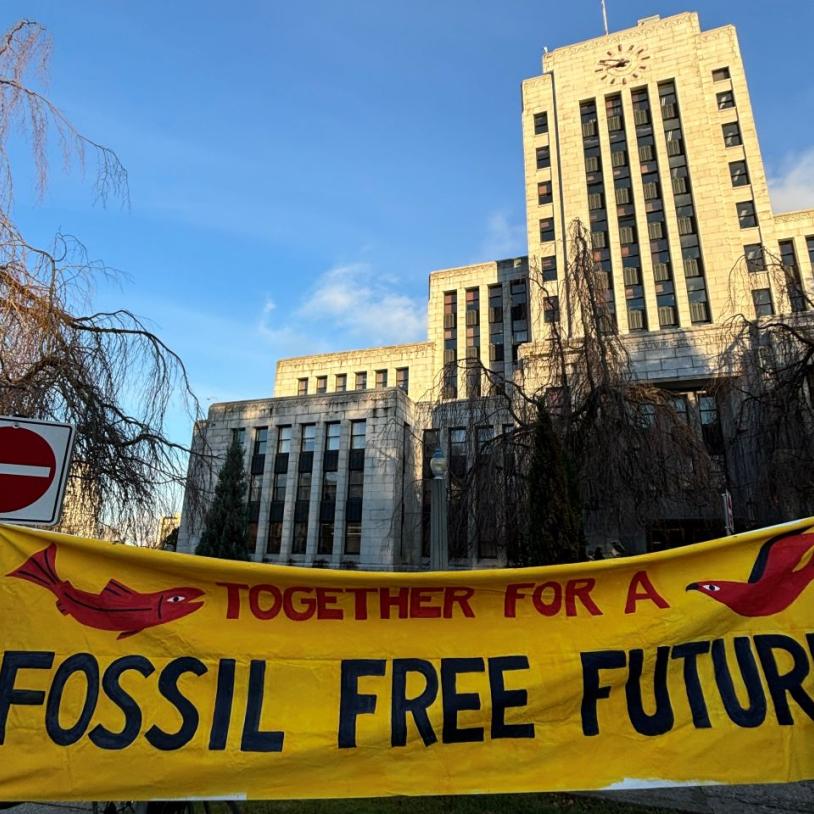Wilderness Committee decries IPPs
Friday, June 4, 2010The Western Canada Wilderness Committee (WCWC) decried independent power projects (IPPs) as “a scam of epic proportions” to a packed gathering of Coast residents at Roberts Creek Community Hall Thursday evening, May 27, at an event co-hosted by the Council of Senior Citizens Organizations of B.C. (COSCO).
“My job here tonight is to say that we can shut this crazy project — to bankrupt us and kill our rivers — down,” WCWC campaign director Joe Foy told attendees.
The WCWC’s Roberts Creek presentation, Our Rivers and Lakes at Risk, is part of the organization’s province-wide tour to communities with proposed IPPs.
WCWC policy director Gwen Barlee compared the province’s recent IPP activity to a “gold rush,” and said independent power producers have “staked” more than 800 of the province’s creeks, rivers and lakes with water licence applications. She called the Sunshine Coast “ground zero” for IPPs, adding there are nearly 200 water licence applications locally.
Barlee blamed the 2002 B.C. Energy Plan for kicking off the activity by giving all new power project development to the private sector, excepting only BC Hydro’s proposed development of Site C. And Barlee said that while the WCWC initially supported run-of-river projects, believing them to have a low environmental footprint and be “bucolic,” the organization has radically altered its position since visiting a number of projects.
“You have road networks, you have logging, you have transmission lines and you have penstocks (pipes),” she said. “So it’s not only the impact on the creek; it’s also all of these other developments that come with the projects.”
Barlee decried regulatory weakening in the province, including drastic cuts to the Ministry of Environment budget over the past seven years, plus the new Clean Energy Act, currently before the legislature, which would “gut” the BC Utilities Commission (BCUC), which functions as a watchdog to government energy decisions. Last year, BCUC stated that the government’s energy plan was “not in the public interest.”
Barlee advocated for stronger environmental standards, province-wide planning so that each project isn’t simply considered as a “one-off,” projects being approved only if acceptable to First Nations and local communities, and public ownership of the province’s power plants.
Sunshine Coast Conservation Association executive director Dan Bouman argued for better environmental assessments of projects, citing Renewable Power’s Tyson Creek Hydro Project near Narrows Inlet, which was recently halted due to sedimentation problems.
“This is the first time where we have seen a graphic illustration of the failure of environmental assessment resulting in a project that does observable environmental damage,” he said.
And Foy decried BC Hydro paying a premium for IPP power, arguing that increased power costs are diverting provincial money from better uses.
“So what the hell is running all these bloody pipes and wires on top of the mountains?” he asked, rhetorically. “It’s school desks and hospital beds!”
In a phone interview, Paul Kariya, executive director of the Independent Power Producers Association of B.C, rebutted WCWC’s statement that the prices being paid for private power are “bankrupting” the province, stating that the prices are “not outrageous.”
“We’ve had exceptionally low power costs and part of that is we’re now living off amortized dams and structures; the last dam that was built in B.C. under BC Hydro was built in 1984,” he said. “It can’t stay that way. When BC Hydro is proposing to build their new Site C project, it would be at the kind of rates [being paid for private power].”
Responding to the numbers presented by WCWC, the Ministry of Energy, Mines and Petroleum Resources stated in an email that there are 47 IPP waterpower projects operating in the province. It further stated that 109 water licences for IPP waterpower projects have been granted, 289 refused or abandoned, and 611 are in the works.
Kariya added that water licence application numbers don’t indicate how many projects will go ahead. In BC Hydro’s last power call, for example, he said, 68 companies bid for contracts, but only 25 were successful.
“Before you get to getting a BC Hydro contract, it’s 100 per cent risk,” he said. “You’ve got to do your consultation with First Nations, you’ve got to start on your environmental stuff, and you don’t have anything that brings in any money — you’ve got nothing you can go to the bank with. And you pray and hope that you can win a contract with Hydro. If you don’t, you’re out of luck.”





